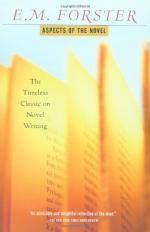|
This section contains 1,823 words (approx. 5 pages at 400 words per page) |

|
As Aspects progresses, Forster moves further away from the doctrine of nineteenth-century realism that novels must be imitations of life and begins to introduce categories that his classically trained lecture audience would have found innovative and exciting, if at times provocatively idiosyncratic, whimsical, and even bizarre. By introducing these categories and by refusing to restrict himself to what can be seen and analyzed within a novel, Forster reintroduced an imaginative and creative strain to criticism that Lubbock' s more positivistic approach had denied. Such a strain was a dominant force in Pater, Wilde, and, at times, James.
Following the chapter on plot, Forster turns to fantasy. Forster's "fantasy" includes the kinds of extraordinary events that James called "romance," but it also includes very different kinds of speculative, tonal, and stylistic departures from realism. Fantasy asks the reader to "accept certain things" that are unnatural. Fantasy "implies the...
|
This section contains 1,823 words (approx. 5 pages at 400 words per page) |

|




